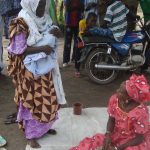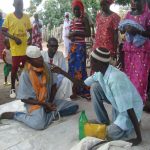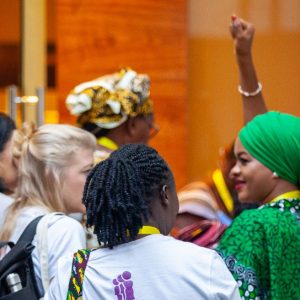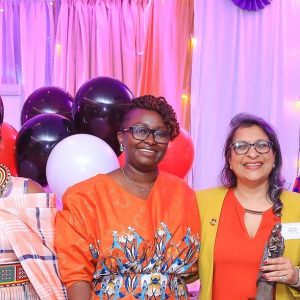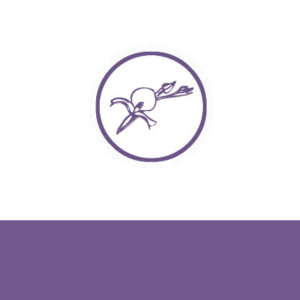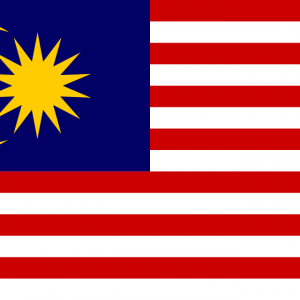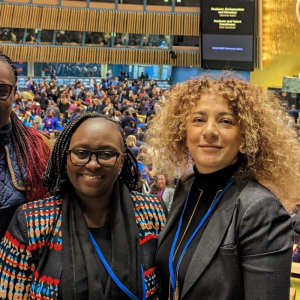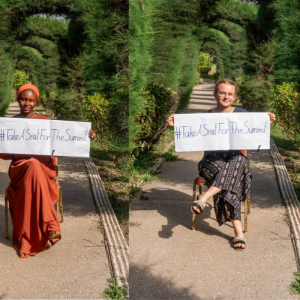As Oumar Pam gesticulates with his arms and calls out instructions, he might be mistaken for a professional director instructing his actors in an upcoming production; the only things missing are the megaphone and director’s chair. In reality, Oumar is a Tostan supervisor helping a group of community members in a Senegalese village. These individuals are preparing a skit for a meeting with neighboring communities that will take place later that day.
In Sinthiang Demba, a village in the Kolda region of Senegal, representatives from 18 villages were gathering to discuss issues such as female genital cutting (FGC) and child/forced marriage. This meeting would include small group discussions and speeches from community leaders as well as the performance of the well-rehearsed skit by volunteers from the host community. This intervillage meeting is like many others that Tostan helps to organize in the region in partnership with the Orchid Project, and the skits always receive a lively reaction from the audience.
Oumar Pam has helped produce films for Medicos del Mundo, the Spanish NGO represented in the Doctors of the World network, on the topic of FGC and has trained individuals who have gone on to be successful actors in Senegal. Oumar was hired by Tostan in 2006 as a consultant on social mobilization and culture, and now helps to organize the skits for intervillage meetings in the Kolda and Sédhiou regions by outlining a plot for each one. “The ideas are drawn from society,” Oumar explains. “They are situations that others have told me about, that I’ve seen, or are from my imagination.” Once Oumar has shared his idea for the skit with the individuals who will be acting, the actors choose their characters and create their own dialogue with which to develop the skit.
As the group of community members from Sinthiang Demba – who may never have acted before and only met Oumar Pam the day before – act out a scenario involving FGC, the audience watches intently and laughs and claps along the way. “Theater allows the audience to feel like they are within the skit that we are performing,” explains Oumar Pam. “It reaches everyone; even if you don’t understand the language, you understand the actions. It is a form of communication that reaches all social classes, reaches men and women.”
Tostan has recognized the importance of employing culturally-sensitive methods of communication during the Community Empowerment Program to allow important messages to be spread among communities. Theater is one of these methods of communication, and skits are performed at almost all intervillage gatherings organized by the Kolda regional office. Depending on the purpose of the event, the skits can also be about themes such as child/forced marriage and education for girls.
For the intervillage meeting in Sinthiang Demba, the sketch is about a grandmother who “kidnaps” her granddaughter to have her cut against the wishes of her parents. Mariam Demb plays the mother in the skit, and when asked why she volunteered for the role, she responds, “To raise awareness among the population. Through theater, people see what happens. They see the actions.” Mamoudou Baldé, the community member who plays the father, says that they are using theater “to demonstrate the difficulties found in society. And we are extremely happy to be able to do so. There are certain subjects that are taboo in society and can only be addressed through theater.” Diabou Baldé, acting as the grandmother, added that what they are doing “wakes people up. The skit makes people understand.”
Based on the responses of the meeting participants in Sinthiang Demba, the skit put on by the community members was a big hit. Oumar Pam helped prepare the actors during rehearsals on how to use the microphone and how to keep their bodies facing towards the audience at all times – useful tips from a seasoned theater veteran on how to put on a good show. But it was the enthusiasm of the volunteer actors that helped bring the scene to life for the audience. Their engagement and desire to encourage the visiting communities to abandon the harmful practice of FGC helped make the intervillage meeting a success. Theater has proven to be a highly effective, and fun, method of transferring information which helps not only to accelerate the movement for the abandonment of FGC, but also to spread information on other human rights issues that will create lasting improvements in the health and wellbeing of communities in Senegal.
Story by Allyson Fritz, Tostan.
This blog is part of a series on the Social Mobilisation project that Orchid Project funds in support of Tostan’s long term Community Empowerment Programme. Social Mobilisation is focused on ensuring the acceleration of abandonment of FGC in Senegal. Teams of volunteers who have already abandoned FGC, called social mobilisation agents, visit and create dialogue with inter-connected communities on human rights and the negative consequences of FGC. Their work aims to spread the message of abandonment and encourage others to join them.
Social mobilisation agents are individual members of the community who have been inspired by their understanding that FGC is a harmful practices, and are eager to share their own experiences with others. Often, they are religious, traditional or community leaders who are widely respected and well-connected, active, influential participants.
You can find out more about Social Mobilisation by clicking here. If you would like to support this work, please click here

